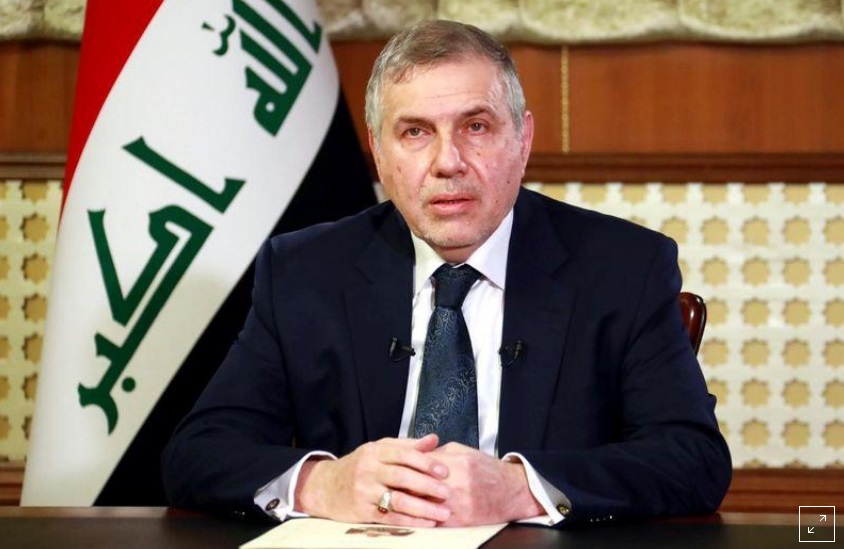Iraqi PM-designate Allawi resigns due to ‘political pressure’
 ERBIL, Kurdistan Region – Iraqi Prime Minister-designate Mohammed Tafwiq Allawi has submitted his resignation following his inability to secure parliamentary approval to form a cabinet, according to Iraqi state TV.
ERBIL, Kurdistan Region – Iraqi Prime Minister-designate Mohammed Tafwiq Allawi has submitted his resignation following his inability to secure parliamentary approval to form a cabinet, according to Iraqi state TV.
“As a sign of respect to the confidence that I was given when I was appointed to form the government, I promised that I would resign if I face any political pressure, because I had promised that I would form an independent government, devoid of political party representatives,” Allawi in a televised speech early on March 2.
Under the Iraqi constitution, he had until the 2nd to form a cabinet.
The Iraqi parliament initially conducted an emergency session on Thursday to vote on Allawi’s cabinet, but did not reach quorum and the vote was postponed to Saturday, and then rescheduled to Sunday.
“If I had ever compromised on my promises, I would have now been the prime minister, but I did not do it,” Allawi said.
“There are some political parties who are not being serious and all they think of is the own interests,” he said. “During the talks, some sides were speaking only of their own interests.”
He did not specifically target or hint at any sides.
“I am calling on the Mr. President [Barham Salih] to accept my apology that I cannot carry out the responsibility I was given,” he added.
He said he did his best to resolve the existing problems gripping Iraq, most notably corruption.
In parts of his speech, he called on the protests to continue.
“I hope the peaceful protests continue so the sacrifices you have made will not go wasted and here I am joining you. I will not compromise,” he added.
The Kurdistan Regional Government’s (KRG) delegation in Baghdad had earlier reached a deal with opposition parties to try and prevent Allawi from forming his cabinet.
Just 120 MPs turned up to last week’s session in Baghdad – shy of the 165 needed to meet quorum. Kurdish and Sunni parties seem to have deliberately avoided the session, alongside some Shiites, because they fear that Allawi intended to exclude their choice of candidates from power.
Caretaker PM Adil Abdul-Mahdi resigned in the face of widespread protests in Iraq’s southern and central provinces. The protests have raged since October 1, 2019, with Iraqis demanding the removal of the post-2003 political elite, an overhaul of the political system, and early elections.
Allawi- appointed as Abdul-Mahdi’s successor- was given a free hand by Shiite parties to choose an independent cabinet on the condition that Kurds and Sunnis grant him the same freedom. His insistence to appoint candidates himself, however, caused tensions with Kurdish representatives.

 A political source said, on Sunday, that Prime Minister-designate Muhammad Tawfiq Allawi will deliver a statement shortly after he withdrew from his mandate to form a government.
A political source said, on Sunday, that Prime Minister-designate Muhammad Tawfiq Allawi will deliver a statement shortly after he withdrew from his mandate to form a government.
 Baghdad / Nina / The economic expert nominated for the post of Minister of Planning in the new government, Mazhar Muhammad Salih, said: “The political blocs respect my independence as a technocrat and a candidate for the ministerial post.”
Baghdad / Nina / The economic expert nominated for the post of Minister of Planning in the new government, Mazhar Muhammad Salih, said: “The political blocs respect my independence as a technocrat and a candidate for the ministerial post.” Baghdad / Al-Ghad Press: The leader of the Sadrist movement, Muqtada al-Sadr, arrived in the capital, Baghdad, and this came before the alleged parliament session was held today, Sunday.
Baghdad / Al-Ghad Press: The leader of the Sadrist movement, Muqtada al-Sadr, arrived in the capital, Baghdad, and this came before the alleged parliament session was held today, Sunday. {Baghdad _ Ain} The delegate of the Ayna news agency in Tahrir Square pointed to the entry of large numbers of demonstrators from a number of governorates to the square, and mentioned that the demonstrators now arriving, most of them from the governorates of Dhi Qar and Wasit and the province of Babel,
{Baghdad _ Ain} The delegate of the Ayna news agency in Tahrir Square pointed to the entry of large numbers of demonstrators from a number of governorates to the square, and mentioned that the demonstrators now arriving, most of them from the governorates of Dhi Qar and Wasit and the province of Babel, Mawazine News – A source close to Prime Minister-designate Muhammad Tawfiq Allawi said on Saturday that the latter had reached agreements with Kurdish and Sunni blocs on the cabinet.
Mawazine News – A source close to Prime Minister-designate Muhammad Tawfiq Allawi said on Saturday that the latter had reached agreements with Kurdish and Sunni blocs on the cabinet. [Baghdad-Ain] A security source said, on Saturday, that demonstrators took control of al-Khilani Square in central Baghdad.
[Baghdad-Ain] A security source said, on Saturday, that demonstrators took control of al-Khilani Square in central Baghdad.